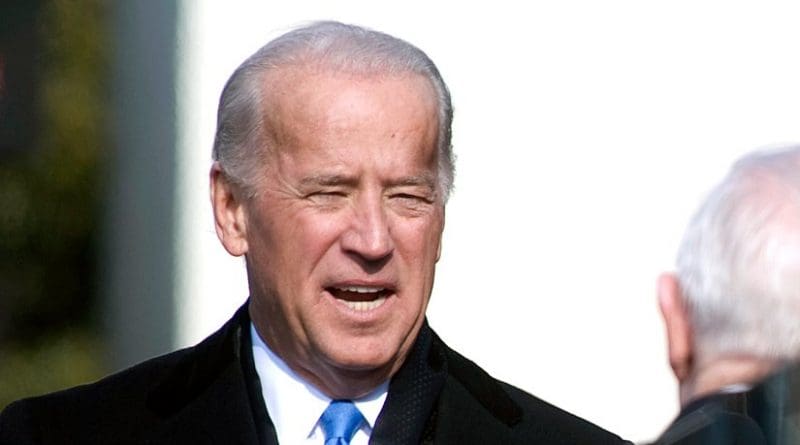Iran Awaits Moment Of Truth With Biden – OpEd
By Arab News
By Dr. Mohammed Al-Sulami*
On the anniversary of the 1979 occupation of the US Embassy in Tehran by Iranian revolutionaries, Supreme Leader Ali Khamenei said the US election results mean nothing to his country, and Iran will continue to take care of its own national and international interests. Almost the exact same statement was repeated by Iranian President Hassan Rouhani and Foreign Minister Javad Zarif.
But in truth, these statements and the fiery speeches seen on Iranian TV screens do not generally reflect the reality and the actual aspirations of the regime in Tehran, especially in light of the economic difficulties it is facing since the start of the Trump administration’s “maximum pressure” policy.
Despite the rhetoric from Tehran, there is a definite desire on its part to return to the pre-2017 situation, especially in the economic and diplomatic spheres.
One of the most prominent results of the 2015 Joint Comprehensive Plan of Action (JCPOA) was that the Iranian economy had a chance to breathe once again. Under the JCPOA, the regime was able to return to the international sphere diplomatically, politically and economically.
This gave it a major boost domestically, strengthening its legitimacy and relative popularity among the Iranian people, who are desperate to escape the successive crises plaguing their regimes over the decades. However, this goodwill and these gains quickly dissipated, especially after the Trump administration withdrew from the JCPOA and imposed unprecedented sanctions on Tehran.
Despite President Donald Trump vowing to legally contest voting tallies in various states, a number of US news agencies have reported that Joe Biden, the vice president under Barack Obama, has won the election.
As a result, Tehran is looking forward to breaking the blockade against it by reaching out to the incoming US administration through its affiliation with the Democratic Party. The Iranian regime hopes that its previous experience with the Democratic Party will be repeated, while addressing some strategic mistakes that were committed previously.
Over the past three years, the Iranian people have been walking on hot coals metaphorically speaking, awaiting the result of the US election, hoping that Trump and his team will leave the White House, and hoping for the arrival of a figure like Biden.
They know him well as he was strongly associated with the JCPOA and the various Iranian-American negotiations during the Obama era. It is worth noting that Zarif spoke in a TV interview about his longstanding and robust friendship with Biden.
Now, however, the issue is not that easy. Regional and international circumstances have changed a lot, and Chinese-American tensions have reached a very advanced stage, along with a downward trajectory in the relationship between Washington and Moscow.
Moreover, it is clear that the Trump administration had taken into consideration the possibility of his successor trying to resume warmer relations with Iran, thus taking steps to ensure that a return to the past state of affairs between Washington and Tehran is largely impossible by imposing sanctions on various Iranian economic and financial entities linked to the Islamic Revolutionary Guard Corps or the nuclear program.
Given the aforesaid circumstances, even if Obama’s entire administration returns to work with Biden, there are major obstacles that will prevent reaching even a fragile agreement such as the JCPOA. Any efforts to do so ignore the current situation, and restoring the previous agreement will not much change the reality on the ground.
Unlike the Trump administration, which preferred the stick approach in its dealings with Iran, Biden may prefer to prioritize the carrot. At present, however, this approach is not suitable in reaching a new agreement, at least during the first two years of Biden’s presidency, even if he eases some of the unilateral US sanctions currently imposed on Tehran and adopts the European position.
There are several possible scenarios being discussed concerning the potential nature of the relationship between Iran and the new US administration. The likeliest and most prominent scenario is the possibility of lifting travel restrictions to the US imposed on citizens of some Muslim countries, including Iran, and on some high-level Iranian figures such as Zarif, as well as sending some positive signals and indications toward Tehran.
The new US administration may also not be very strict in regards to implementing some of the recent sanctions imposed by the Trump administration. In general, however, the Biden administration is expected to wait until the results of the next Iranian presidential election in mid-2021 to decide on its approach.
Nevertheless, it is necessary to take into account Biden’s statements about Iran. He has said he does not “question the reality of the challenges that the regime imposes in Iran on the security interests of America, its friends, partners, and the people of Iran themselves.”
The approach Biden will adopt in dealing with Iran was outlined in his article published by CNN on Sept. 20 under the title: “There is a smarter way to be tough on Iran.”
In the article, he said he would aim to prevent Iran from acquiring a nuclear weapon, and would work with Washington’s allies to strengthen and expand the terms of the JCPOA while also addressing other important issues such as working hard to release US citizens who have been unjustly detained, exposing Tehran’s human rights violations and confronting its destabilizing activities, such as its support for terrorism and its ballistic missile program.
Finally, Biden said the US would resume the diplomatic track and re-enter the JCPOA if Iran strictly complies with it.
- Dr. Mohammed Al-Sulami is head of the International Institute for Iranian Studies (Rasanah). Twitter: @mohalsulami

